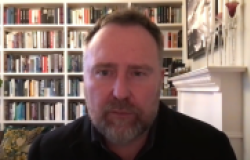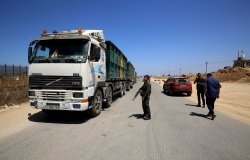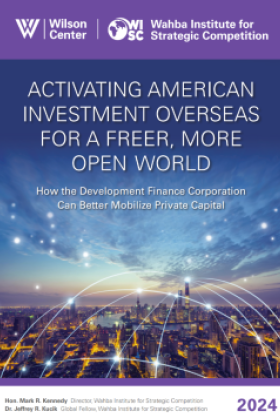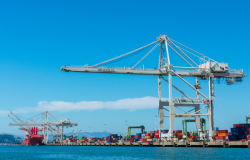Realism Canadian Style: The Chrétien Legacy in Foreign and Defense Policy and the Lessons for Canada-U.S. Relations
Joel Sokolsky, Professor of Political Science at the Royal Military College of Canada, reviewed the history of Canadian foreign and defense policy as well as their effect on U.S.-Canada relations at a seminar sponsored by Canada Institute.
Overview
Joel Sokolsky, Professor of Political Science at the Royal Military College of Canada, reviewed Canadian foreign and defense policy in a January 15 seminar sponsored by the Wilson Center's Canada Institute. He said that Canada-U.S. relations are coming out of the recent chill surrounding American disappointment over Canada's non-participation in the Second Gulf War.
Sokolsky said that Canadian participation in the Iraq War would not have had any impact on its outcome, nor would it have yielded Ottawa any influence in the subsequent rebuilding of Iraq. Although Canada was conspicuous by its absence, it would have been inconspicuous by its presence. The incident shows what can happen when Washington openly asks Ottawa to do something as a litmus test of Canadian loyalty to America, and Ottawa portrays the request as a litmus test of Canadian sovereignty.
Canada and other U.S. allies have been criticized as being weak and failing to conduct realist foreign policies. Sokolsky argued that from Canada's perspective, Canada followed the dictates of realism by basing its foreign policy on domestic considerations, attempting to further and enhance its own interests and values as determined by its government, just as the United States does. For former Prime Minister Jean Chrétien, "realism" did not mean "in concert with U.S. desires." Canadian foreign policy has often projected a "smokescreen" of super-liberal internationalism for public consumption at home that is taken at face value abroad.
Canada cannot project power overseas; its defense is national defense. Canadian defense spending is relatively low—"just enough," as Sokolsky said, so as not to be a problem. Canada has historically been active militarily, a big contributor to the first and second world wars. In the post-war period, Canada may not have been a major power, but was a "hyperactive" [smaller] power according to Sokolsky. Canada went in two directions: it pursued collective security with the United Nations, and collective defense with the United States. He argued that Canada was not a "free rider" on defense, rather an "easy rider"; Canada was not asleep in the 1990s; it was over-committed abroad with peacekeeping missions, foreign interventions, and military occupations (there were more Canadian forces in Kosovo at the end of the 1990s than there were in Germany following World War II—and the forces were actively fighting). These were appropriate missions for Canada, Sokolsky implied, remarking that "Superpowers don't do windows." No offer of Canadian assistance has ever been refused.
Canada, like other U.S. allies, seeks recognition and influence, but in the new unipolar world, who is relevant? who is listened to? Sokolsky asked. Canada was comfortable with President Clinton's approach of "unilateralism with a smile." Canada was has not understood and assimilated the effects of 9-11 on America, which has brought on "unilateralism with a vengeance." In spite of Canada's refusal to join the coalition of the willing, Canada did have a significant presence in the Persian Gulf (and has since 1990), and is now the largest contributor of forces to Afghanistan.
Few if any vital Canadian issues are at stake outside Canadian borders. Former Foreign Minister Lloyd Axworthy's human security agenda did reflect Canadian values, though it was essentially a discretionary agenda and a projection of "soft power." For all the emphasis which Axworthy placed on the human security agenda, and even for all the great efforts Canada made in the 1990s to contribute to peacekeeping and peace enforcement operations, the main thrust of the Chrétien foreign policy, and the core of his government's realist legacy, was economics. The government had in 1995 explicitly made prosperity and employment for Canadians its top foreign policy priority and concentrated spending on "Team Canada" trade missions abroad.
Canada's realistic approach is to assist the United States on homeland security, which is vital to maintaining economic relations even though having an overseas presence remains important. Sokolsky pondered where the United States thought Canada should spend its security dollars. He noted that in Paul Martin's first post-9-11 budget, there was a greater emphasis on security than on defense, with specific attention to immigration and smart borders. Cooperation in security, though, is not the purview of the Department of National Defence or the Canadian Forces; it falls to the RCMP and to the new Ministry of Public Safety.
Sokolsky said one of the most important questions to ask is, what does the United States need from Canada? and more specifically, what does the United States need in North America to defend American interests? Cooperation in North America is possible and Canada can do it, since the American focus is overseas. Where is money best spent? The United States defends itself by helping Canadians defend Canada. That said, Canada would like some credit for what it has done in North America, particularly with respect to border issues. Would Canada be recognized, or have any influence, on overseas participation with the United States on Iraq?
Canada has to make choices on what it will spend its money on; if Canada doesn't spend on basic capacity, though, it risks losing its position in many organizations (G8, NATO, North American missile defense: Canada won't be part of the warning). Sokolsky said that until now, Canada has been able to get high results with low defense spending. But will increased military spending by Canada make a difference? The navy is interoperable with the U.S. with "1980s-new" equipment, save the helicopters. Canadian needs are health care, exports to the U.S., and security with respect to the U.S. Whatever Canadians send is OK, it does not endanger the coalition of the "billing."
Sokolsky was skeptical of any white paper review of the Canadian military, since there is not a lot of faith in the review process, which would take too long. Canadians believe that if the process works, the policy will work. He does not think that the Canadian people would agree to increased defense spending; the public rates defense as a low priority. Even though it says it cannot possibly do what is required with its impossibly small budgets, the military somehow manages to squeak by. Increased military spending in Canada might not happen until the military is unable to respond to a domestic emergency appropriately.
David N. Biette
Director, Canada Institute
202-691-4133
Hosted By

Canada Institute
The mission of the Wilson Center's Canada Institute is to raise the level of knowledge of Canada in the United States, particularly within the Washington, DC policy community. Research projects, initiatives, podcasts, and publications cover contemporary Canada, US-Canadian relations, North American political economy, and Canada's global role as it intersects with US national interests. Read more
Thank you for your interest in this event. Please send any feedback or questions to our Events staff.










